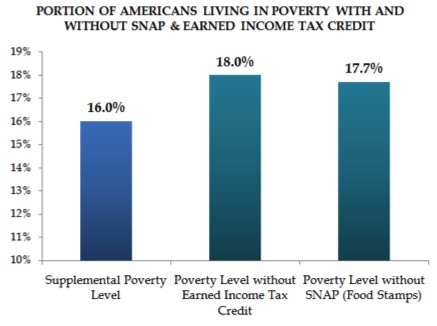New Poverty Measure Shows Public Programs Reduce the Number of Americans Living in Poverty
November 21st, 2011
While a recent article focuses on the impact of poverty on the lives of individuals here in Mississippi, the Federal Poverty Level is a measure of economic well-being that reaches across America.
This month, the Census Bureau released a new Supplemental Poverty Measure that is intended to better incorporate the expenses and benefits individuals encounter in today’s economy. While the supplemental measure will not replace the official Federal Poverty Level, it does provide valuable insights about programs and expenses that affect families in extreme financial hardship.
The new supplemental measure shows a slightly lower poverty rate in the south last year- 16.3 percent under the new measure compared to 17 percent under the official poverty level. The south’s poverty rate under the new measure was not statistically different from the nation’s poverty rate. The West and Northeast both had upticks in poverty using the new measure.
To determine a family’s poverty status, the new measure takes a family’s income and subtracts the cost of necessary expenses related to work, out of pocket medical expenses and child care. In addition, the measure adds in-kind benefits to a family’s income like tax credits, nutrition assistance and school lunch.
THE NEW POVERTY MEASURE, EITC & SNAP
The new measure demonstrates that SNAP (previously Food Stamps) and the Earned Income Tax Credit both helped substantially reduce the number of Americans living in poverty in 2010. The U.S. Census Bureau found that without the Earned Income Tax Credit, poverty levels would have reached 18% in 2010 compared to the actual rate of 16%. In the absence of SNAP, poverty levels would have risen to 17.7%. The chart below shows these differences and underscores the importance of both programs in insulating families from poverty.
On the national level, decisions made over the next few months will substantially impact funds available for many critical programs including SNAP/Food Stamps and the Earned Income Tax Credit. Both initiatives have been demonstrated to lift families out of poverty and need to be preserved.
More broadly, Mississippi and U.S. leaders are making important decisions about funding public programs and structures that impact economic opportunity for the state’s residents. The risk of continued cuts to key programs that are proven to support Mississippi’s working poor families necessitates a balanced approach that includes raising revenue.
See more from the Census Bureau’s presentation on the Supplemental Poverty Measure here.
Author: Sarah Welker, Policy Analyst






